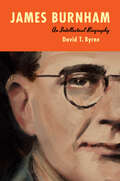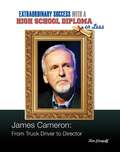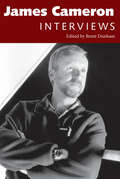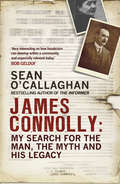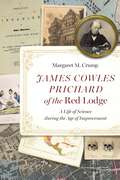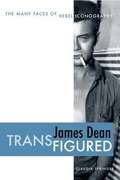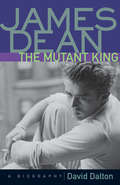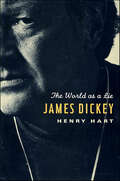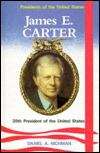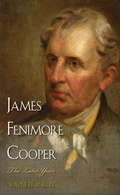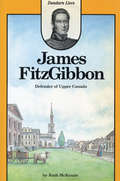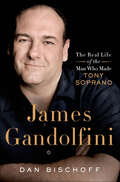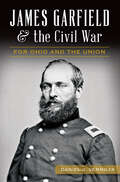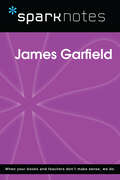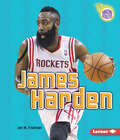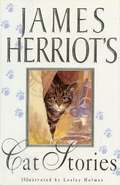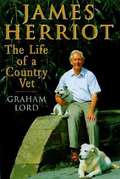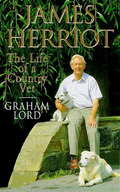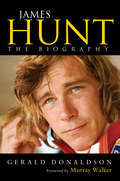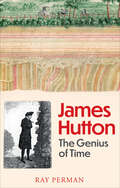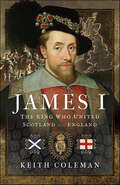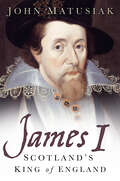- Table View
- List View
James Buchanan: Fifteenth President Of The United States
by David R. CollinsPresents the life of James Buchanan, including his childhood, education, employment, and political career.
James Burnham: An Intellectual Biography
by David T. ByrneIn this intellectual biography of one of the most important political thinkers of the twentieth century, David T. Byrne reveals the fascinating life of James Burnham. Beginning his intellectual career as a disciple of Leon Trotsky, Burnham preached socialist revolution to the American working classes during the Great Depression. In 1940 he split with Trotsky over the nature of the USSR. Attempting to explain the world that was emerging in the early days of World War II, Burnham penned one of the most successful political works of the early 1940s, titled The Managerial Revolution. This dystopian treatise predicted collectivization and rule by bland managers and bureaucrats. Burnham's next book, The Machiavellians, argued that political elites seek only to obtain and maintain power, and democracy is best achieved by resisting them.After World War II, Burnham became one of the foremost anticommunists in the United States. His The Struggle for the World and The Coming Defeat of Communism remain two of the most important books of the early Cold War era. Rejecting George F. Kennan's policy of containment, Burnham demanded an aggressive foreign policy against the Soviet Union. Along with William F. Buckley, Burnham helped found National Review magazine in 1955, where he expressed his political views for more than two decades.As Byrne shows in James Burnham, the political theorist's influence has stretched from George Orwell to Ronald Reagan to Donald Trump's base. Burnham's ideas about the elite and power remain part of US political discourse and, perhaps, have more relevance than ever before.
James Cameron: From Truck Driver to Director (Extraordinary Success with a High School)
by Kim EtingoffIn the last few decades, more and more people are going to college to further their education. It's hard to become a scientist, a professor, or a businessperson without getting some sort of college degree--but college isn't always necessary to achieve success. Some people are ready to enter the workforce right after high school. James Cameron was one of these people. The successful director has created some of Hollywood's biggest hits. From "Aliens" to "Avatar", from "Terminator" to "Titantic", Cameron has been making dreams--and nightmares--come to life on screen for decades. And what's most amazing about his story is that the famous filmmaker did it all without a college degree!
James Cameron: Interviews (Conversations with Filmmakers Series)
by Brent DunhamJames Cameron (b. 1954) is lauded as one of the most successful and innovative filmmakers of the last thirty years. His films often break records, both in their massive budgets and in their box-office earnings. They include such hits as The Terminator, Aliens, The Abyss, Titanic, and Avatar. Part scientist, part dramatist, Cameron combines these two qualities into inventive and captivating films that often push the boundaries of special effects to accommodate his imagination. James Cameron: Interviews chronicles the writer-director's rise through the Hollywood system, highlighted by his “can-do” attitude and his insatiable drive to make the best film possible. As a young boy growing up in Canada, Cameron imagined himself an astronaut, a deep-sea explorer, a science fiction writer, or a filmmaker. Transplanted to southern California, he would go on to realize many of those boyhood fantasies. This collection of interviews provides glimpses of the filmmaker as he advances from Roger Corman's underling to “king of the world.” The interviews are drawn from a number of sources including TV appearances and conversations on blogs, which have never been published in print. Spanning more than twenty years, this collection constructs a concise and thorough examination of Cameron, a filmmaker who has almost single-handedly ushered Hollywood into the twenty-first century.
James Connolly: My Search for the Man, the Myth and his Legacy
by Sean O'CallaghanFROM THE FORMER IRA MEMBER AND AUTHOR OF THE INFORMER, SEAN O'CALLAGHAN'Very interesting on how fanaticism can develop within a community, and especially relevant today.' Bob GeldofThe story of revolutionary James Connolly, his role in the 1916 Easter Rising, and his subsequent influence both on O'Callaghan himself, and on 20th century Irish politics.Easter Monday, 24th April, 1916: James Connolly, a 48-year-old Edinburgh-born Marxist and former British soldier, stands at the top of the steps of Liberty Hall, Dublin. 'We are going out to be slaughtered,' Connolly told his comrades, and with this he set in train the Easter Rising of 1916.Two weeks later, in a scene that has haunted Nationalist Ireland ever since, he was carried to his place of execution having been badly wounded. Placed on a chair, he was shot dead by soldiers of the army he had once served in.This is not a traditional biography; it is a book about Sean O'Callaghan's relationship with a man who was to deeply influence his formative years; it is about the politics of violent extremism that O'Callaghan subsequently became caught up in; and it's about the kind of individuals who are willing to sacrifice everything, including their lives, for a holy cause.Never has a book been more timely.
James Cowles Prichard of the Red Lodge: A Life of Science during the Age of Improvement (Critical Studies in the History of Anthropology)
by Margaret M. CrumpMargaret M. Crump offers the first thorough biography of British scientist and physician James Cowles Prichard (1786–1848), an intellectual giant in the developing human sciences, a pioneering psychiatric theorist, and Europe&’s leading anthropologist during the first half of the nineteenth century.
James Dean Transfigured: The Many Faces of Rebel Iconography
by Claudia SpringerAfter the death of James Dean in 1955, the figure of the teen rebel permeated the globe, and its presence is still felt in the twenty-first century. Rebel iconography--which does not have to resemble James Dean himself, but merely incorporates his disaffected attitude--has become an advertising mainstay used to sell an array of merchandise and messages. Despite being overused in advertisements, it still has the power to surprise when used by authors and filmmakers in innovative and provocative ways. The rebel figure has mass appeal precisely because of its ambiguities; it can mean anything to anyone. The global appropriation of rebel iconography has invested it with fresh meanings. Author Claudia Springer succeeds here in analyzing both ends of the spectrum--the rebel icon as a tool in upholding capitalism's cycle of consumption, and as a challenge to that cycle and its accompanying beliefs. In this groundbreaking study of rebel iconography in international popular culture, Springer studies a variety of texts from the United States and abroad that use this imagery in contrasting and thought-provoking ways. Using a cultural studies approach, she analyzes films, fiction, poems, Web sites, and advertisements to determine the extent to which the icon's adaptations have been effective as a response to the actual social problems affecting contemporary adolescents around the world.
James Dean: A Biography
by David DaltonThis is the book that restarted the James Dean cult by celebrating him as the cool, defiant visionary of pop culture who made adolescence seem heroic instead of awkward and who defined the style of rock 'n' roll's politics of delinquency. The only book to fully show how deliberately and carefully Dean crafted his own image and performances, and the product of still unequalled research, vivid writing, intimate photographs, and profound meditation, James Dean: The Mutant King has become almost as legendary as its subject.
James Dickey: The World as a Lie
by Henry HartA fascinating biography of one of the most popular, colorful, and notorious American poets of our century.The legendary Southern poet James Dickey never shied away from cultivating a heroic mystique. Like Norman Mailer and Ernest Hemingway, he earned a reputation as a sportsman, boozer, war hero, and womanizer as well as a great poet, novelist, screenwriter, and essayist. But James Dickey made lying both a literary strategy and a protective camouflage; even his family and closest friends failed to distinguish between the mythical James Dickey and the actual man. Henry Hart sees lying as the central theme to Dickey's life; and in this authoritative, immensely entertaining biography he delves deep behind Dickey's many masks. Letters, anecdotes, tall tales and true ones, as well as the reluctant but finally candid cooperation of Dickey himself animate Hart's narration of a remarkable life. Readers of Dickey's National Book Award-winning poetry, his bestselling novel Deliverance, and anyone who witnessed his electrifying readings of his work will savor this book.
James Douglas: Father of British Columbia
by Julie H. FergusonJames Douglas’s story is one of high adventure in pre-Confederation Canada. It weaves through the heart of Canadian and Pacific Northwest history when British Columbia was a wild land, Vancouver didn’t exist, and Victoria was a muddy village. Part black and illegitimate, Douglas was born in British Guiana (now Guyana) in 1803 to a Scottish plantation owner and a mixed-race woman. After schooling in Scotland, the fifteen-year-old Douglas sailed to Canada in 1819 to join the fur trade. With roads non-existent, he travelled thousands of miles each year, using the rivers and lakes as his highways. He paddled canoes, drove dogsleds, and snowshoed to his destinations. Douglas became a hard-nosed fur trader, married a part-Cree wife, and nearly provoked a war between Britain and the United States over the San Juan Islands on the West Coast. When he was in his prime, he established Victoria and secrured the western region of British North America from the Russian Empire and the expansionist Americans. Eventually, Douglas became the controversial governor of the Colonies of Vancouver Island and British Columbia and oversaw the frenzied Fraser and Cariboo gold rushes.
James E. Carter: 39th President Of The United States
by Richard G. Young Daniel A. RichmanFollows the life of Jimmy Carter, including his childhood, education, employment, political career, and term of presidency.
James Fenimore Cooper: The Later Years
by Wayne FranklinA definitive new biography of James Fenimore Cooper, early nineteenth century master of American popular fiction American author James Fenimore Cooper (1789–1851) has been credited with inventing and popularizing a wide variety of genre fiction, including the Western, the spy novel, the high seas adventure tale, and the Revolutionary War romance. America’s first crusading novelist, Cooper reminds us that literature is not a cloistered art; rather, it ought to be intimately engaged with the world. In this second volume of his definitive biography, Wayne Franklin concentrates on the latter half of Cooper’s life, detailing a period of personal and political controversy, far-ranging international travel, and prolific literary creation. We hear of Cooper’s progressive views on race and slavery, his doubts about American expansionism, and his concern about the future prospects of the American Republic, while observing how his groundbreaking career management paved the way for later novelists to make a living through their writing. Franklin offers readers the most comprehensive portrait to date of this underappreciated American literary icon.
James FitzGibbon: Defender of Upper Canada
by Ruth McKenzieJames FitzGibbon, Defender of Upper Canada, is the often poignant story of a poor man’s rise to authority in the Upper Canada of the 1800s. Born the son of a tenant farmer in Ireland, FitzGibbon’s valour as a soldier brought him to the attention of those destined for power in the Canadas. Hero of the Battle of Beaver Dams in 1813, one o the decisive battles in the War of 1812, FitzGibbon’s brilliance as tactician and negotiator was needed time and again — whether to settle Irish unrest on the Cornwall Canal, or to organize Toronto’s defence against William Lyon Mackenzie’s rebel forces in 1837. As a public administrator, FitzGibbon’s rise was slow and disappointing. Despite holding a multitude of offices, he was continually in debt. And despite repeated petitions, FitzGibbon’s tireless military and public services went unrecognized and unrewarded. His final reward as a ceremonial knight in Windsor Castle adds a tragicomic touch to a fascinating tale.
James Gandolfini: The Real Life of the Man Who Made Tony Soprano
by Dan BischoffJames Gandolfini: The Real Life of the Man Who Made Tony Soprano is the first biography of the actor who died, in June 2013 at age 51, widely recognized as one of the best—and most defining—actors of his generation. The book is informed by fresh interviews with Sopranos actors, the star's acting teachers and coaches, his childhood friends, buddies from his days as a nightclub bouncer, and Hollywood figures including the directors of his posthumously released films. Bischoff decodes Gandolfini's portrayal of mobsters and bad guys from his breakout role in True Romance with Patricia Arquette to the television series role that made his career, and his portrayals of real people like Leon Panetta in Zero Dark Thirty. Gandolfini's personal life--from his marriages and family interactions to his deep friendships with his fellow cast members—enriches and enlivens this book, and deepens our understanding of the star.James Gandolfini: The Real Life of the Man Who Made Tony Soprano is a fascinating look at Gandolfini's complicated relationship to his roots, to the role that made him wealthy beyond his imagination, and to American notions of masculinity, power and fame. Even as he scaled the heights of his profession, creating a TV character as vivid as Carroll O'Connor's Archie Bunker and as volcanic as Marlon Brando's Stanley Kowalski, Gandolfini remained a reluctant celebrity dedicated more to his craft than to his career. James Gandolfini: The Real Life of the Man Who Made Tony Soprano delivers a textured, multilayered portrait of the on- and off-screen life of a complex, talented man who rose from an Italian immigrant family in northern New Jersey to join the ranks of America's most iconic actors.
James Garfield & the Civil War: For Ohio and the Union
by Daniel J VermilyaThis biography of America&’s twentieth president sheds light on his Civil War years, when he served as a major general for the Union Army. While his presidency was tragically cut short by his assassination, James Abraham Garfield's eventful life covered some of the most consequential years of American history. When the United States was divided by war, Garfield was one of many who stepped forward to defend the Union. In this biography, historian Daniel J. Vermilya reveals the little-known story of Garfield's role in the Civil War. From humble beginnings in Ohio, Garfield rose to become a major general in the Union army. His military career took him to the backwoods of Kentucky, the fields of Shiloh and Chickamauga, and ultimately to the halls of Congress. His service during the war established Garfield as a courageous leader who would one day lead the country as president.
James Garfield (SparkNotes Biography Guide)
by SparkNotesJames Garfield (SparkNotes Biography Guide) Making the reading experience fun! SparkNotes Biography Guides examine the lives of historical luminaries, from Alexander the Great to Virginia Woolf. Each biography guide includes:An examination of the historical context in which the person lived A summary of the person&’s life and achievements A glossary of important terms, people, and events An in-depth look at the key epochs in the person&’s career Study questions and essay topics A review test Suggestions for further reading Whether you&’re a student of history or just a student cramming for a history exam, SparkNotes Biography guides are a reliable, thorough, and readable resource.
James Harden (Amazing Athletes Ser.)
by Jon M. FishmanHouston Rockets guard James Harden lit up scoreboards to the tune of more than 25 points per game in 2014-2015. That made him one of the best scorers in the league. But he wasn't always such a star player. When James played for the Oklahoma City Thunder from 2009 to 2012, he started only seven games. After signing on with Houston for the 2012-2013 NBA season, James exploded as one of the top players in the NBA. Read all about James's journey from his birthplace in Los Angeles to NBA stardom in Houston.
James Herriot's Cat Stories
by James HerriotKittens and cats of all kinds abound in this book and, like their flesh-and-blood counterparts, they will purr their way into the hearts and minds of everyone who hears their stories. This warm and joyful volume of stories collects some of the Yorkshire vet's favorite tales about one of his favorite animals―each memoir as memorable and heartwarming as the last.
James Herriot: The Life Of A Country Vet
by Graham LordLord writes a revealing and affectionate biography of the remarkable veterinarian and beloved author who enlightened readers with All Things Bright and Beautiful and All Creatures Great and Small.
James Herriot: The Life of a Country Vet
by Graham LordAlf Wight, a modest Scottish writer, better known as James Herriot, wrote books that became worldwide best sellers, films, audiobooks, and a much-loved television show. In The Life of a Country Vet, Graham Lord has written a detailed and affectionate biography of this remarkable man. Lord carefully documents Wight's life, beginning with his childhood in Glasgow and his years in veterinary college. Following his development as a writer, the source of his pen name, and his struggles to get published. Along the way, we encounter some extraordinary events and hidden tragedies in this seemingly magical life. Millions of fans laughed and cried at Wight's delightful stories of life as a vet. Lord reveals that some of the stories were utterly true, and some were utterly fictional. He illuminates the real relationships between the memorable characters that inhabit the books. This warm yet insightful portrait by Lord - who knew his subject very well - will be enjoyed by Wight's myriad of fans. It also dispels the myths that have grown around the life of one of the most famous and deeply loved vets the world has known.
James Herriot: The Life of a Country Vet
by Graham LordAlf Wight, a modest Scottish writer, better known as James Herriot, wrote books that became worldwide best sellers, films, audiobooks, and a much-loved television show. In The Life of a Country Vet, Graham Lord has written a detailed and affectionate biography of this remarkable man. Lord carefully documents Wight's life, beginning with his childhood in Glasgow and his years in veterinary college. Following his development as a writer, the source of his pen name, and his struggles to get published. Along the way, we encounter some extraordinary events and hidden tragedies in this seemingly magical life. Millions of fans laughed and cried at Wight's delightful stories of life as a vet. Lord reveals that some of the stories were utterly true, and some were utterly fictional. He illuminates the real relationships between the memorable characters that inhabit the books. This warm yet insightful portrait by Lord - who knew his subject very well - will be enjoyed by Wight's myriad of fans. It also dispels the myths that have grown around the life of one of the most famous and deeply loved vets the world has known.
James Hunt: The Biography
by Gerald DonaldsonJames Hunt was a towering personality with a commanding presence, a hugely glamorous public figure who brought Formula One motor racing to the attention of a whole new audience.Triumphing against all odds to become World Drivers' Champion with McLaren in 1976, Hunt sank into a period of decadence and depression, only to be rejuvenated as he found true love for the first time. With that came personal contentment and a renewed zest for living, so that one of the most colourful and controversial figures in Grand Prix racing is best remembered by those close to him as a fun-loving, caring man who had a genuinely uplifting presence - qualities that shine through in Gerald Donaldson's compelling and moving account of his life.
James Hutton: The Genius of Time
by Ray PermanDiscover one of the Scottish Enlightenment's brightest stars. Among the giants of the Scottish Enlightenment, the name of James Hutton is overlooked. Yet his Theory of the Earth revolutionised the way we think about how our planet was formed and laid the foundation for the science of geology. He was in his time a doctor, a farmer, a businessman, a chemist yet he described himself as a philosopher – a seeker after truth. A friend of James Watt and of Adam Smith, he was a polymath, publishing papers on subjects as diverse as why it rains and a theory of language. He shunned status and official position, refused to give up his strong Scots accent and vulgar speech, loved jokes and could start a party in an empty room. Yet much of his story remains a mystery. His papers, library and mineral collection all vanished after his death and only a handful of letters survive. He seemed to be a lifelong bachelor, yet had a secret son whom he supported throughout his life. This book uses new sources and original documents to bring Hutton the man to life and places him firmly among the geniuses of his time.
James I, The King Who United Scotland and England
by Keith ColemanThe life of King James VI who united England and Scotland under one crown and became James I in 1603 is marked by contradictions. Generally praised as a good king of Scotland and a poor English one, James was a deep theological thinker, but he also inspired a superstitious frenzy which resulted in the North Berwick witch hunt and trials in the 1590s. Scholar and pedant, he was in his own view God’s appointed ruler, yet also a foul mouthed sloven and forever tarnished with the title of the Wisest Fool in Christendom. The most glaring contrast in his personal life was between his image as a married family man and as a ruler who lavished indiscreet affection on a series of men whom he invested with considerable power. This book approaches James through the lens of his relationships with his major favorites. First was Anglo-French lord Esme D’Aubigny, then Scottish squire Robert Carr (later Earl of Somerset), and finally the consummate nobleman George Villiers, Duke of Buckingham. ‘A king will have need to use secrecy in many things,’ the king wrote in one of his books. Although his private life was sometimes astonishingly visible, there are still many mysteries about James I as a man rather than a ruler. This work tracks the king’s life from a barren childhood through a succession of plots, intrigues and conspiracies in Scotland which largely forged, or deformed, his character. Beyond his complex and disputed connection with these men the book looks at his relationship with his wife, sponsorship of the arts, and contains a reappraisal of the first and most neglected historical mystery of his first reign, the Gowrie Conspiracy.
James I: Scotland's King of England
by John MatusiakFew kings have been more savagely caricatured or grossly misunderstood than England’s first Stuart. Yet, as this biography demonstrates, the modern tendency to downplay his defects and minimise the long-term consequences of his reign has gone too far.In spite of genuine idealism and flashes of considerable resourcefulness, James I remains a perplexing figure – a uniquely curious ruler, shot through with glaring inconsistencies. His vices and foibles not only undermined his high hopes for healing and renewal after Elizabeth I’s troubled last years, but also entrenched political and religious tensions that eventually consumed his successor. A flawed, if well-meaning, foreigner in a rapidly changing and divided kingdom, his passionate commitment to time-honoured principles of government would, ironically, prove his undoing, as England edged unconsciously towards a crossroads and the shadow of the Thirty Years War descended upon Europe.

